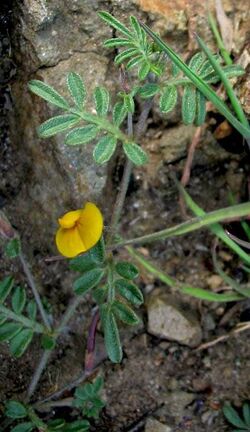Biology:Ottleya strigosa
| Ottleya strigosa | |
|---|---|

| |
| Scientific classification | |
| Kingdom: | Plantae |
| Clade: | Tracheophytes |
| Clade: | Angiosperms |
| Clade: | Eudicots |
| Clade: | Rosids |
| Order: | Fabales |
| Family: | Fabaceae |
| Subfamily: | Faboideae |
| Genus: | Ottleya |
| Species: | O. strigosa
|
| Binomial name | |
| Ottleya strigosa (Nutt.) D.D.Sokoloff
| |
| Synonyms[1][2] | |
| |
Ottleya strigosa, synonyms Lotus strigosus and Acmispon strigosus, is a flowering plant in the pea family (Fabaceae), native to the southwestern United States and northern Mexico.[1] It is known as stiff-haired lotus[citation needed] or strigose bird's-foot trefoil.[3][4]
Description
Ottleya strigosa is a prostrate annual herb. It is sometimes roughly hairy as its name suggests, but it may be somewhat woolly, fuzzy, or nearly hairless as well. Its slender branches are lined with leaves each made of several small leaflets. The leaves are 1/2" to 1" long.[4] They are pinnately divided, with 4-9 obovate, alternate, leaflets, on a flattened rachis.[4] The inflorescence bears one or two yellow to orange or red pealike flowers, each with a corolla one half to one centimeter across. The fruit is a legume pod 1 to 3 centimeters long.
Distribution and habitat
It is native to the southwestern United States (California and Nevada) and northern Mexico,[1] where it is known from many types of habitat, including disturbed areas.
References
- ↑ 1.0 1.1 1.2 "Ottleya strigosa (Nutt.) D.D.Sokoloff", Plants of the World Online (Royal Botanic Gardens, Kew), https://powo.science.kew.org/taxon/urn:lsid:ipni.org:names:1007026-1, retrieved 2018-02-11
- ↑ "Plant Name Details for Acmispon strigosus (Nutt.) Brouillet", The International Plant Names Index, http://www.ipni.org/ipni/idPlantNameSearch.do?id=60448555-2, retrieved 2018-02-11
- ↑ "Lotus strigosus". Natural Resources Conservation Service PLANTS Database. USDA. https://plants.usda.gov/core/profile?symbol=LOST4. Retrieved 23 June 2015.
- ↑ 4.0 4.1 4.2 Mojave Desert Wildflowers, Pam MacKay, 2nd Ed. 2013, p232
External links
Wikidata ☰ {{{from}}} entry

